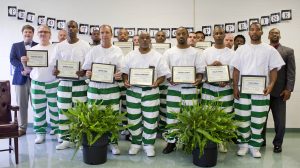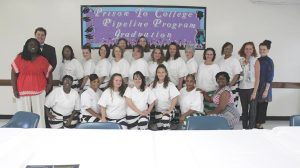
Co-directors Otis Pickett (back row, left) and Patrick Alexander (back row, right) with 16 graduates of the summer 2016 Prison-to-College Pipeline course at the Mississippi State Penitentiary. Submitted photo/Mississippi Department of Corrections
OXFORD, Miss. – A partnership between the University of Mississippi and Mississippi College is promoting higher education in prison and helping incarcerated men and women transform their lives as they earn credits toward a college education.
The Prison-to-College Pipeline Program began in summer 2014 with 17 students at the Mississippi State Penitentiary at Parchman. Since then, 61 men have completed a PTCPP course at the facility. Twenty of those have earned English credits from Ole Miss and several have received history credits from Mississippi College.
“Working with men who have been participants in and graduates of the Prison-to-College Pipeline Program has been one of the greatest joys of my life,” said Patrick Alexander, UM assistant professor of English and African American studies. “To have the opportunity to play a small role in encouraging and advancing the very large educational goals, intellectual curiosities, and college and post-college dreams of men of all ages who are serving time at Parchman in particular has been an unprecedented honor.”
Alexander, who has taught African-American literature courses in prison systems in North Carolina and Mississippi for the past decade, partnered with Otis Pickett, Mississippi College assistant professor of history, to create the program. Pickett said it has been the singular greatest experience of his career.
“To have the opportunity to address a social justice issue through my profession and as part of my teaching role is a unique opportunity and one that I am incredibly proud of,” he said. “I thought I was coming to teach these students, but they are the ones teaching me.”
Last summer, the program expanded to the Central Mississippi Correctional Facility for women in Pearl. Pickett and Stephanie Rolph, associate professor of history at Millsaps College, team-taught a course there on “Turning Oppression into Opportunity.”
Eighteen students completed that for-credit college course, which was likely the first one taught at a women’s prison by Mississippi university faculty members.

Co-teachers Otis Pickett (back row, left) and Stephanie Rolph (back row, second from right) with the 18 graduates of the summer 2016 Prison-to-College Pipeline course at Central Mississippi Correctional Facility. Submitted photo/Mississippi Department of Corrections.
“The most valuable part of this experience for me has been the enthusiasm with which these women participate,” Rolph said. “You don’t have to explain to them why history matters; they already know. As an instructor, that is one of the most satisfying experiences I can hope for.”
In fall 2016, the PTCPP offered its first-ever course during the regular academic calendar at Parchman. The course, titled “Freedom: Literature and Creative Writing,” was team-taught by Alexander and Ann Fisher-Wirth, UM professor of English and director of the environmental studies minor who won the 2014 Elsie M. Hood Outstanding Teacher Award.
“I have been very moved by my experience teaching in the PTCP program and I am so proud of the students in this class, many of whom had not really studied poetry before, but all of whom approached it with interest and curiosity,” she said.
Each of Fisher-Wirth’s 11 PTCPP students had an original poem or prose work included in the Parchman Portfolio, which she edited for the online journal About Place.
“Their work has been read by thousands of people,” she said. “In my 40 years of college-level teaching, I’ve never had a teaching experience that meant more to me.”
Comments from anonymous students about the program have been equally positive.
“I took the first course with Dr. Alexander and Dr. Pickett, which was an awesome experience, and this course (with Alexander/Fisher-Wirth) was awesome as well. The professors actually care about teaching us.”
Another student reported that the course “exceeded my expectations because I gained enormous skills that were hidden deep within me.”
“Your time and dedication to the service of men, who many people feel aren’t deserving of this level of education, shows that there are genuinely good people still in this world,” another student said. “The lessons I’ve learned are invaluable.
“When I become a published author, I will be certain to put the names of Dr. Fisher-Wirth and Dr. Alexander at the top of my acknowledgement page.”
Since the program’s inception, Alexander and Pickett have continued to teach their inaugural course, titled “Justice Everywhere.” Its original content, which focused on speeches and/or writings of Martin Luther King Jr., Fannie Lou Hamer and Barack Obama, has expanded to include Ida B. Wells and Maya Angelou.
“I am so thankful for the support of the College of Liberal Arts at the University of Mississippi, to Mississippi College and to the Mississippi Humanities Council for funding this work,” Pickett said. “I am also thankful for Parchman and Central Mississippi Correctional, who have allowed us to come in, offer courses and to teach students.
“My greatest thanks go to the students, whose hard work in the most difficult of conditions proves what the human spirit is capable of.”